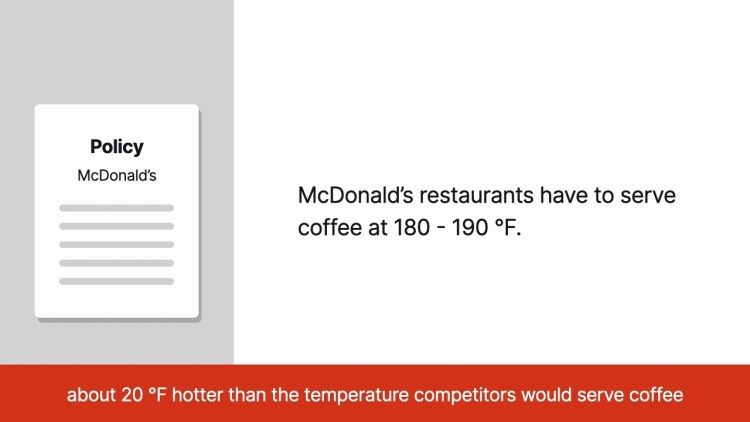Liebeck v. McDonald’s Restaurants
New Mexico District Court
1995 WL 360309 (1994)
- Written by Rose VanHofwegen, JD
Facts
Seventy-nine-year-old Stella Liebeck (plaintiff) went to a McDonald’s Restaurants (defendant) drive-through with her grandson and ordered a cup of coffee. The coffee spilled in Liebeck’s lap, causing severe third-degree burns over 16 percent of her body. The burns required skin grafts, eight days in the hospital, and two years of medical treatment. Liebeck asked McDonald’s for $20,000 to cover her costs, but McDonald’s offered her only $800. Liebeck hired an attorney and brought a defective-products-liability lawsuit, asserting the coffee was too hot and that McDonald’s should have warned customers about the risk of burns. McDonald’s had a written policy requiring its restaurants to serve coffee at 180°F to 190°F, about 20°F hotter than competitors’. Both sides hired experts who debated the reasonableness of that temperature. The testimony showed that at 190°F, coffee can produce third-degree burns in under three seconds. At 180°F, it takes 12 to 15 seconds. At 160°F, it takes a full 20 seconds. More than 700 people, including children, had suffered burns from the coffee in the preceding 10 years, with McDonald’s settling claims for more than $500,000. A McDonald’s expert played down the number of burns by pointing it was a small percentage of millions of cups of coffee served and blamed Liebeck for spilling her coffee. Liebeck’s experts countered that the coffee was not fit for consumption as served. Her doctor testified she had one of the worst scald burns he had ever seen, and the jury saw graphic, compelling photographs of her injuries. The jury awarded Liebeck $200,000 in compensatory damages but found her 20 percent at fault, meaning she could recover $160,000. The jury also awarded Liebeck close to $3 million in punitive damages. Although New Mexico law has no specific cap on recoverable punitive damages, after trial the judge reduced the punitive damages to $480,000 (triple the compensatory award) for a total award of $640,000. The judge denied McDonald’s request for a new trial, and McDonald’s appealed.
Rule of Law
Issue
Holding and Reasoning ()
What to do next…
Here's why 906,000 law students have relied on our case briefs:
- Written by law professors and practitioners, not other law students. 47,100 briefs, keyed to 995 casebooks. Top-notch customer support.
- The right amount of information, includes the facts, issues, rule of law, holding and reasoning, and any concurrences and dissents.
- Access in your classes, works on your mobile and tablet. Massive library of related video lessons and high quality multiple-choice questions.
- Easy to use, uniform format for every case brief. Written in plain English, not in legalese. Our briefs summarize and simplify; they don’t just repeat the court’s language.





